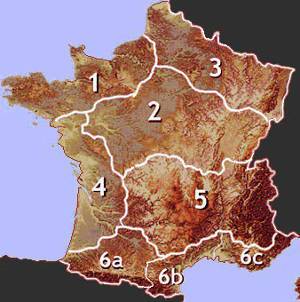| Gitelink for mobiles | Gitelink for full-screens | French route maps | French travel and tourism guide |

Opening and running gites
 Owners
who have been running gites for a number of years are used to
them : but for new owners, or those whose properties have just been
"discovered", falling for a gite booking scam can be a costly business.
Owners
who have been running gites for a number of years are used to
them : but for new owners, or those whose properties have just been
"discovered", falling for a gite booking scam can be a costly business.
Gitelink - since 1999
Book holiday cottages in France directly with the owners. No commissions, no fees,Search for gites on our maps (click map below):

Or browse our regional gites listings pages
Click for information on the regions of France
| Index: | Recognising a scam | Avoiding a scam | How scams work |
It will come as no surprise to some – but as an unwelcome surprise to others – to learn that the world of gite bookings, or holiday rental bookings and even b and b and hotel bookings, is frequented by a shady army of scammers, people (generally in faraway countries) makeing a bit on the side, or even a good living, out of scamming accommodation owners into sending them money..... which they will never see again.
Owners can be scammed by email, or by a scammer using the contact form on their website, or even by supposed customers sent on by booking-portals that do not reveal the owner's own website even if he has one.
How to recognise a booking scam
Often it is fairly easy, specially when the owner has his own website, and receives an email or contact-form message directly from the scammer. Here are the tell-tale signs:- The email is in poor English, yet purports to come from someone calling himself Dr. John Brown, or Mr. James Graves, or Mr. Peter Johnson or a similar very classic English-sounding name
- The text is generic, and does not mention the name of the property or the owner
- It mentions, in the initial enquiry, the number of people wanting to rent rooms (and even sometimes their names, such as my son Mark (21) and my two daughters Emma and Sarah
- It claims to be a request for a group of friends, or colleagues, coming for a conference in your area.
- It asks, in the initial email, how the booking can be paid for.
An actual recent scam doing the rounds recetly, had variants on this text: - including a personalised header:
I'd like to rent your charming gite for 4 weeks from April 22 to May 20, 2025 for vacation with my wife. Please confirm availability and the rental price for the period.
Best regards,
Wade Denman
Avoiding scams : what to do if you receive a scam booking
Generally, the simplest answer is: delete the email at once.However, if you are sure that it is a scam (for instance, at least two of the tell-tale signs are present), and the email comes from a scammer using an email address on gmail, aol, yahoo, outlook, or one of the big throaway email address providers, forward the email to "abuse@gmail.com", or "abuse@aol.com"... in function of the address of the originating email.. The big providers want to keep scammers out of their emails, and will deal with abuse complaints, specially if they get them from multiple sources.
IMPORTANT: Don't report innocent people who have had their email address hacked. If the email appears to have been sent from, let's say, "caroline.rundell@college.ox.ac.uk", check that the reply is being sent to the same address. If not, "Caroline Rundell" has probably had her email address stolen... though she may exist and still be using it, blissfully unaware, and quite legitimately. It is very easy to send an email from a forged address, and include instructions in the "header" to send any reply to a different address. If you want to report an address, it's not "Caroline's" address that has to be reported, but the "reply-to" address. If in any doubt, do nothing; just bin the email.
How do scams work ?
There are a number of different scam techniques, among which one of the simplest (and probably most successful) is the "Overpaid deposit" scam. It works like this.Mr Crook emails back, saying that he wants to send the deposit by bank transfer, so please send account details.
The unsuspecting owner sends Mr Crook his or her account details.
It all seems very genuine. Within a few hours, the holiday rental owner receives a payment into his account, from Mr. Crook; but instead of being for 100 €, it comes in as a payment of 1000 Euros.
There are two possible next steps; either the alarmed owner immediately emails Mr Crook to say he's sent too much; or Mr Crook soon emails to say he or his bank has made a slip, and has sent too much, and could the owner be so kind as to send back the difference.....
Still suspecting nothing, and indeed by now convinced that Mr.Crook is genuine, since he has sent a payment, the owner does just that, and sends 900 € back to the account that Mr Crook designates.
What the owner does not know is that many banks credit international payments immediately they come through.... but only do so provisionally, on condition that the sending bank confirms the payment. This is all stated in the small details of the bank's terms and conditions, and companies know this; private individuals frequently do not. With international payments, and notably intercontinental payments, confirmation can take two weeks or sometimes even more.
So two weeks after having sent Mr.Crook back his
reimbursement, our innocent owner is eventually informed by the bank
that Mr.Crook's original payment was refused by the paying bank in some
faraway country (Nigeria is a frequently quoted) and the original
credit of 1000 € has been un-credited.
As for the reimbursement, the poor property owner has no way
of getting it back. He or she made a perfectly genuine international
payment, and the bank has no authority to ask for it to be repaid by a
bank in some distant land. Besides, by the time a UK or French bank put
through a demand for reimbursement, if it actually did so, Mr. Crook's
account will probably have been emptied, if not closed.
The poor owner's 900€ reimbursement (and it could be
quite a bit more) is lost, and it's not going to come back.
It's a classic scam !
There are variants on this, but no holiday-rental owner should ever
make an international reimbursement before the original incoming
payment has been fully cleared by his bank.
Copyright Gitelink 2025
